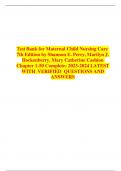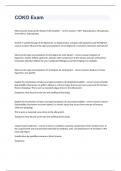Test Bank for Maternal Child Nursing Care
7th Edition by Shannon E. Perry, Marilyn J.
Hockenberry, Mary Catherine Cashion
Chapter 1-50 Complete: 2023-2024 LATEST
WITH VERIFIED QUESTIONS AND
ANSWERS
,Chapter 01: 21st Century Maternity Nursing
1. When providing care for a pregnant woman, the nurse should be aware that one of the most
frequently reported maternal medical risk factors is:
a. Diabetes mellitus. c. Chronic hypertension.
b. Mitral valve prolapse (MVP). d. Anemia.
ANS: A
2. To ensure optimal outcomes for the patient, the contemporary maternity nurse must
incorporate both teamwork and communication with clinicians into her care delivery, The SBAR
technique of communication is an easy-to-remember mechanism for communication. Which of
the following correctly defines this acronym?
a. Situation, baseline assessment, response
b. Situation, background, assessment, recommendation
c. Subjective background, assessment, recommendation
d. Situation, background, anticipated recommendation
ANS: B
3. The role of the professional nurse caring for childbearing families has evolved to emphasize:
a. Providing care to patients directly at the bedside.
,b. Primarily hospital care of maternity patients.
c. Practice using an evidence-based approach.
d. Planning patient care to cover longer hospital stays.
ANS: C
4. A 23-year-old African-American woman is pregnant with her first child. Based on the statistics
for infant mortality, which plan is most important for the nurse to implement?
a. Perform a nutrition assessment.
b. Refer the woman to a social worker.
c. Advise the woman to see an obstetrician, not a midwife.
d. Explain to the woman the importance of keeping her prenatal care appointments.
ANS: D
5. During a prenatal intake interview, the nurse is in the process of obtaining an initial
assessment of a 21-year-old Hispanic patient with limited English proficiency. It is important for
the nurse to:
a. Use maternityjargon in order for the patient to become familiar with these terms.
,b Speak quickly and efficientlyto expedite the visit.
.
c. Provide the patient with handouts.
d Assess whether the patient understands the discussion.
ANS: D
6. When managing health care for pregnant women at a prenatal clinic, the nurse should
recognize that the most significant barrier to access to care is the pregnant woman‘s:
a. Age. c. Educational level.
b. Minority status. d. Inability to pay.
ANS: D
7. What is the primary role of practicing nurses in the research process?
a. Designing research studies
b. Collecting data for other researchers
c. Identifying researchable problems
d. Seeking funding to support research studies
ANS: C
8. When the nurse is unsure about how to perform a patient care procedure, the best action would
,a. Ask another nurse.
b. Discuss the procedure with the patient‘s physician.
c. Look up the procedure in a nursing textbook.
d. Consult the agency procedure manual and follow the guidelines for the procedure.
ANS: D
9. From the nurse‘s perspective, what measure should be the focus of the health care system to
reduce the rate of infant mortality further?
a. Implementing programs to ensure women‘s early participation in ongoing
prenatal care
b. Increasing the length of stay in a hospital after vaginal birth from 2 to 3 days
c. Expanding the number of neonatal intensive care units (NICUs)
d. Mandating that all pregnant women receive care from an obstetrician
ANS: A
10. Alternative and complementary therapies:
a. Replace conventional Western modalities of treatment.
,b. Are used by only a small number of American adults.
c. Recognize the value of clients‘ input into their health care.
d. Focus primarily on the disease an individual is experiencing.
ANS: C
11. A 38-year-old Hispanic woman delivered a 9-pound, 6-ounce girl vaginally after being in
labor for 43 hours. The baby died 3 days later from sepsis. On what grounds would the woman
potentiallyhave a legitimate legal case for negligence?
a. She is Hispanic. c. The standards of care were not met.
b. She delivered a girl. d. She refused fetal monitoring.
ANS: C
12. A newly graduated nurse is attempting to understand the reason for increasing health care
spending in the United States. Her research finds that these costs are much higher compared with
other developed countries as a result of:
a. A higher rate of obesity among pregnant women.
b. Limited access to technology.
c. Increased usage of health care services along with lower prices.
,d. Homogeneity of the population.
,ANS: A
13. The term used to describe legal and professional responsibility for practice for maternity
nurses is:
a. Collegiality. c. Evaluation.
b. Ethics. d. Accountability.
ANS: D
14. Through the use of social media technology, nurses can link with other nurses who may share
similar interests, insights about practice, and advocate for patients. The most concerning pitfall
for nurses using this technology is:
a. Violation of patient privacy and confidentiality.
b. Institutions and colleagues may be cast in an unfavorable light.
c. Unintended negative consequences for using social media.
d. Lack of institutional policy governing online contact.
ANS: A
15. An important development that affects maternity nursing is integrative health care, which:
a. Seeks to provide the same health care for all racial and ethnic groups.
,b. Blends complementary and alternative therapies with conventional Western
, treatment.
c. Focuses on the disease or condition rather than the background of the client.
d. Has been mandated by Congress.
ANS: B
16. Recent trends in childbirth practices in the United States indicate that:
a. More than 15% of mothers had late or no prenatal care.
b. The percentage of Hispanics, non-Hispanic African Americans, and Caucasians
who received prenatal care was essentially the same.
c. Births occurring in the hospital accounted for 99% of births.
d. Cesarean births have been declining as a percentage of live births.
ANS: C
17. Recent trends in childbirth practice indicate that:
a. Delayed pushing is now discouraged in the second stage of labor.
b. Episiotomyrates are increasing.





